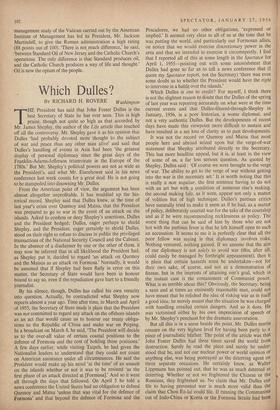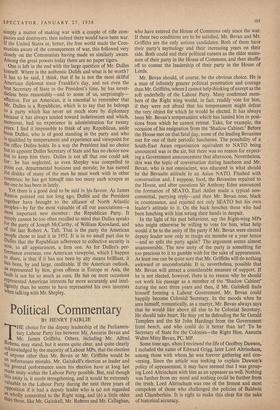. Which Dulles?
BY RICHARD H. ROVERE Washington T-HE President has said that John Foster Dulles is the best Secretary of State he has ever seen. This is high praise, though not quite so high as that accorded by Mr. James Shepley, the author of the Life article that touched off all the controversy. Mr. Shepley gave it as his opinion that Dulles 'had probably devoted more thought to the subject of war and peace than any other man alive' and said that Dulles's handling of events in Asia had been 'the greatest display of personal diplomacy since the great days of the Franklin-Adams-Jefferson triumvirate in the Europe of the 1780s.' But Mr. Shepley's political powers are not as wide as the President's, and what Mr. Eisenhower said in his news conference last week counts for a great deal. He is not going to be stampeded into disowning Mr. Dulles.
From the American point of view, the argument has been almost altogether unprofitable. It has muddied up the his- torical record. Shepley said that Dulles knew, at the time of last year's crisis over Quemoy and Matsu, that the President was prepared to go to war in the event of an attack on the islands. Asked to confirm or deny Shepley's assertions, Dulles and the President hedged; Dulles, eager perhaps to shield Shepley, and the President, eager certainly to shield Dulles, stood on their right to refuse to discuss in public the privileged transactions of the National Security Council and the Cabinet. In the absence of a disclaimer by one or the other of them, it may now be inferred that in all likelihood the President had, as Shepley put it, decided to regard 'an attack on Quemoy and the Matsus as an attack on Formosa.' Normally, it would be assumed that if Shepley had been flatly in error on this matter, the Secretary of State would have been in honour bound to say so. even if the repudiation gave hurt to a friendly journalist.
By his silence, though, Dulles has called his own veracity into question. Actually, he contradicted what Shepley now reports almost a year ago. Time after time, in March and April of 1955, the Secretary of State made it plain that the President was not committed to regard any attack on the offshore islands as an act that would cause us to honour our treaty obliga- tions to the Republic of China and make war on Peiping. In a broadcast on March 8, he said, 'The President will decide as to the over-all value of certain coastal positions to the defence of Formosa and the cost of holding these positions.' A few days earlier, while visiting Taipeh, he had given the Nationalist leaders to 'understand that they could not count on American assistance under all circumstances. He said the President would make up his mind 'at the time' of an assault on the islands whether or not it was to be resisted 'as the first phase of an attack directed at [Formosa].' And so it went all through the days that followed. On April 5 he told a news conference the United States had no obligation to defend Quemoy and Matsu 'unless that was vital for the defence of Formosa' and that beyond the defence of Formosa and the Pescadores, we had no other obligations, 'expressed or implied.' It seemed very clear to all of us at the time that he was putting the world, and particularly our Formosan allies, on notice that we would exercise discretionary power in the area and that we intended to exercise it circumspectly. I find that I reported all of this at some length in the Spectator for April 1, 1955—pointing out with some astonishment that Dulles had gone so far as to tell a news conference that (I quote my S,pectator report, not the Secretary) 'there was even some doubt as to whether the President would have the right to intervene in a battle over the islands.'
Which Dulles is one to credit? For myself, I think there is not the slightest reason to doubt that the Dulles of the spring of last year was reporting accurately on what were at the time current events and that Dulles-filtered-through-Shepley in January, 1956. is a poor historian, a worse diplomat, and not a very authentic Dulles. But the developments of recent days have made this viewpoint more difficult to sustain and have resulted in a net loss of clarity as to past developments.
It was not the record on Quemoy and Matsu that most people here and abroad seized upon but the verge-of-war statement that Shepley attributed directly to the Secretary. This has more headline appeal, but it is, at least in the view of some of us, a far less serious question. As quoted by Shepley, Dulles said : 'Of course we were brought to the verge of war. The ability to get to the verge of war without getting into the war is the necessary art.' It is worth noting that this is really a non sequitur, the first sentence having to do not with an art but with a condition of someone else's making. the second making fate, as it were, appear not only a matter of volition but of high technique. Dulles's partisan critics have naturally tried to make it seem as if he had, as a matter of policy, deliberately courted war for the sake of the courtship and as if he were recommending recklessness as policy. The worst thing that can be said of him by those who are not hot with the partisan fever is that he left himself open to such an accusation. It seems to me it is perfectly clear that all the poor fellow was saying is that diplomacy involves risks. Nothing ventured, nothing gained. If we assume that the aim of our diplomacy is not solely to avoid war (this, after all, could easily be managed by forthright appeasement). then it is plain that certain hazards must be undertaken—not for their own sake, of course, and not as a demonstration of finesse, but in the interests of attaining one's goal, which in the instant case is the containment of Communist power. What is so terrible about this? Obviously, the Secretary. being a sane and at times an eminently reasonable man, could not have meant that he relished the idea of risking war as in itself a good idea; he merely meant that the situation he was charged with handling entailed certain dangers. And so it does. He was victimised either by his own imprecision of speech or by Mr. Shepley's penchant for the dramatic asseveration.
But all this is in a sense beside the point. Mr. Dulles merits censure on the very highest level for having been party to a piece of journalistic blather. The point of the article was that John Foster Dulles had three times saved the world from destruction. Surely he read the piece and surely he under- stood that he, and not our nuclear power or world opinion or anything else, was being portrayed as the deterring agent on three separate occasions. He certainly knew, as Walter Lippmann has pointed out, that he was as much deterred as deterring. Whether or not we frightened the Chinese or the Russians, they frightened us. No claim that Mr. Dulles can file to having prevented war is much more valid than the claim that Chou En-lai could file. If running the Communists out of Indo-China or Korea or the Formosa Straits had been simply a matter of making war with a couple of rifle com- panies and destroyers, then indeed there would have been war. If the United States or, better, the free world made the Com- munists aware of the consequences of war, this followed very closely on the Communists having made us similarly aware. Among the great powers today there are no paper tigers.
One is left in the end with the large question of Mr. Dulles himself. Where is the authentic Dulles and what is he worth? It has to be said, I think, that if he is not the most skilful American diplomat since Franklin's day, and not even the best Secretary of State in the President's time, he has never- theless been reasonably—and to some of us, surprisingly— effective. For an American, it is essential to remember that Mr. Dulles is a Republican, which is to say that he belongs to a party which has never set much store by diplomacy because it has always tended toward isolationism and which, Moreover, had no experience in administration for twenty Years. I find it impossible to think of any Republican, aside from Dulles, who is of good standing in the party and who is qualified by temperament and experience and viewpoint for the office Dulles holds. In a way the President had no choice but to appoint Dulles Secretary of State and has no choice now but to keep him there. Dulles is not all that one could ask for he has neglected, as even Shepley was compelled to Point out, departmental business and morale; he has earned the dislike of many of the men he must work with in other Countries; he has got himself into too many such scrapes as the one he has been in lately. Yet there is a good deal to be said in his favour. As James Reston pointed out not long ago, Dulles and the President together have brought to the alliance of North Atlantic Peoples—by far the most valuable of all our associations—a most important new member : the Republican Party. It for cannot be too often recalled to mind that Dulles speaks 'or the party of Joseph McCarthy, of William Knowland, and of the late Robert A. Taft. That is the party the American People chose to lead it in 1952. It is in no small part due to °lines that the Republican adherence to collective security is now. to all appearances. a firm one. As for Dulles's per- formance overseas, one American viewpoint, which I happen to share, is that if it has not been by any means brilliant, it has been, by and large. creditable. If the American outlook, as represented by him, gives offence in Europe or Asia, the fault is not his so much as ours. He has on most occasions ,rePresented American interests far more accurately and intel- ligently than he seems to have represented his own interests when talking with Mr. Shepley.











































 Previous page
Previous page